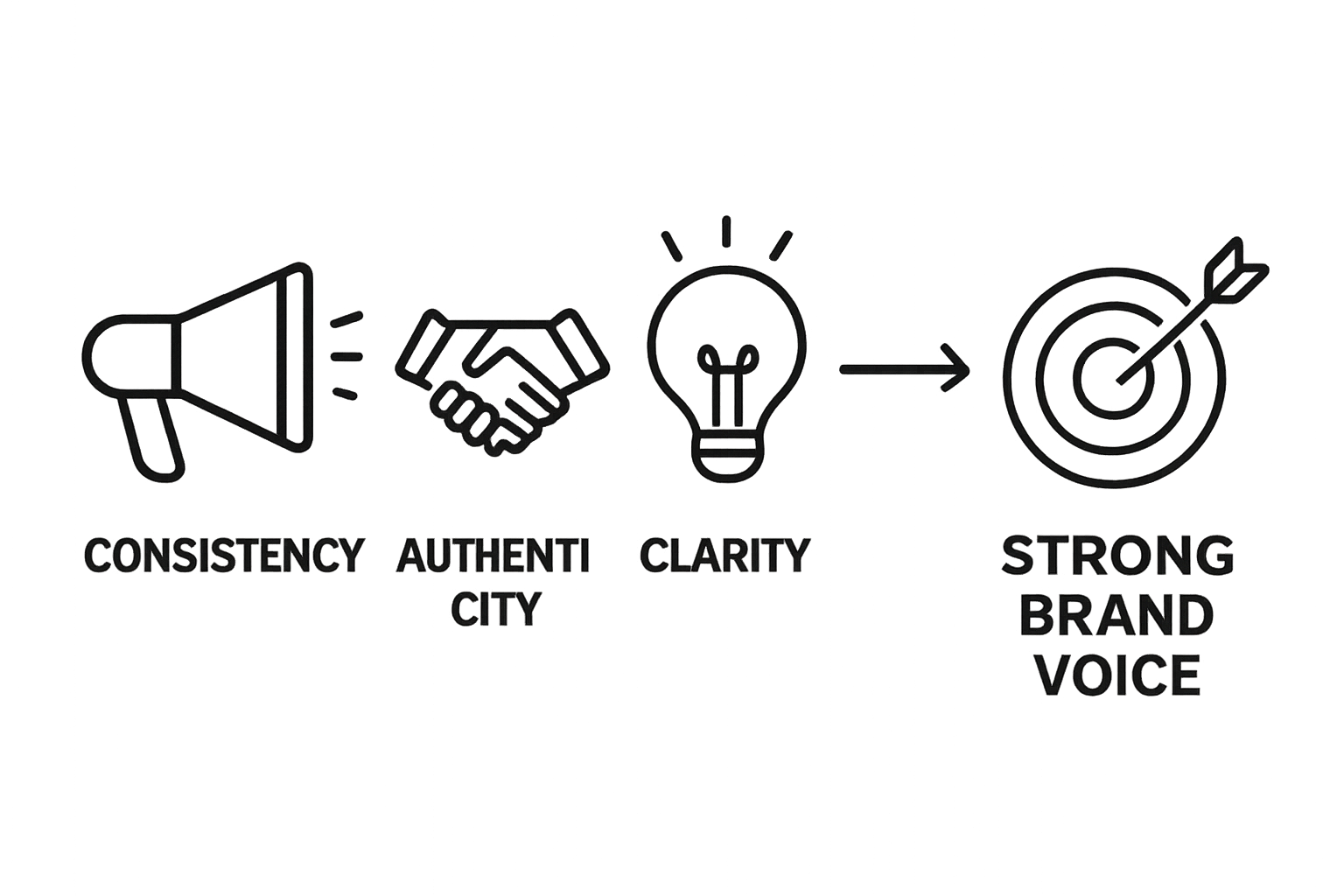Branding Elements That Drive Small Business Growth

Explore why brand voice matters for your business success and how it shapes connection, trust, and recognition in the marketplace.

Every business wants to be remembered. A striking fact is that brands with a consistent voice see up to 23 percent higher revenue compared to those with a scattered presence. Most people think it is all about what you say and how clever your words sound. But the real power comes from how your brand voice makes people feel and the lasting impression it leaves behind.
| Takeaway | Explanation |
|---|---|
| Develop a consistent brand voice | A uniform communication style builds familiarity and trust with your audience across all platforms. |
| Infuse personality into your messaging | Human-like traits make your brand relatable, helping to create emotional connections with customers. |
| Align voice with core values | Ensure that your brand voice reflects your organization’s beliefs and mission, reinforcing authentic connections. |
| Utilize storytelling in communication | Framing messages as compelling narratives makes your communication distinctive and memorable. |
| Prioritize clarity and authenticity | Clear, genuine messaging reflects your brand’s values, enhancing trust and engagement with your audience. |
Brand voice is the unique personality and emotional tone that defines how a business communicates with its audience. It goes beyond mere words, representing the fundamental character and spirit of an organization through consistent language, messaging, and communication style.
At its essence, brand voice is composed of several critical components that work together to create a distinctive communication approach.
This table summarizes and compares the four main elements that give a brand voice its unique character, as described in the article.
| Element | Description | Example Application |
|---|---|---|
| Tone | The emotional inflection present in brand communication | Friendly, professional, inspirational |
| Language | The specific words, phrases, and stylistic choices a brand uses | Simple wording, industry jargon, slang |
| Purpose | The underlying intention or goal behind each message | Educate, entertain, persuade |
| Personality | The humanlike traits or behaviors consistently represented in brand messaging | Playful, sophisticated, empathetic |
| Northern Illinois University describes brand voice as the way an organization sounds, emphasizing how language expresses brand personality. |
Key characteristics that shape brand voice include:
Brand voice is not just about what you say, but how you say it. It serves as a critical differentiator in a crowded marketplace, helping businesses stand out by creating a memorable and consistent communication experience. When executed effectively, brand voice builds trust, creates emotional connections, and helps audiences instantly recognize and relate to your organization.
Think of brand voice like a person’s personality. Just as individuals have unique ways of expressing themselves, brands have distinctive communication styles that reflect their core values, mission, and character. A tech startup might sound innovative and direct, while a luxury brand might communicate with elegance and sophistication.
By developing a clear, authentic brand voice, businesses transform generic communication into a powerful tool for building lasting relationships with their audience.
Trust represents the foundational currency of business relationships. Your brand voice acts as a critical mechanism for establishing and maintaining this trust, transforming communication from transactional interactions into meaningful connections with your audience.
Cal Poly Small Business Development Center highlights that maintaining a consistent brand voice helps businesses stand out and connect authentically with their target audience. When customers encounter a predictable and genuine communication style, they develop a sense of familiarity and reliability.
To clarify the different psychological triggers that contribute to building trust through brand voice, the following table outlines and defines each key factor highlighted in the article.
| Psychological Trigger | Definition |
|---|---|
| Authenticity | Communicating genuine intentions and values, ensuring messages are honest and true to the brand |
| Transparency | Being clear and straightforward in messaging to foster openness with the audience |
| Reliability | Maintaining consistent communication patterns so that the audience knows what to expect |
| Empathy | Demonstrating understanding of customer experiences and responding to their needs and emotions |
Key psychological triggers that build trust through brand voice include:
Brand voice transcends simple communication strategies. It becomes a strategic asset that differentiates your business in competitive markets. Customers do not just purchase products or services they purchase experiences and relationships.
When your brand voice remains consistent across different platforms digital marketing, customer service, social media a profound psychological effect occurs. Potential customers begin to view your organization as predictable and trustworthy. This perception transforms casual interactions into long term relationships.

Consider how major brands like Apple or Nike have cultivated distinctive voices that resonate beyond their products. Their communication style tells a story larger than their immediate offerings creating an emotional connection that inspires customer loyalty.
Ultimately, brand voice is about crafting a narrative that makes your audience feel understood, respected, and valued. By investing in a genuine and consistent communication approach, businesses can turn trust from an abstract concept into a tangible competitive advantage.
In a marketplace saturated with competing businesses, brand voice emerges as a powerful instrument for standing out and creating meaningful connections with your audience. It transforms your communication from generic messaging into a distinctive narrative that sets you apart from competitors.
Semantic Brand Score Research demonstrates how strategic brand communication can fundamentally reshape audience perception. Brand voice is not merely about being different it is about being authentically memorable.
Elements that make your brand voice unique include:
Every business sector has standard communication patterns. A technology company might typically sound technical, a healthcare provider professional, a lifestyle brand trendy. Your brand voice allows you to break these expectations and create a truly distinctive presence.
Consider brands like Slack, which communicates with playful professionalism, or Mailchimp, known for its quirky and approachable tone. These companies do not just sell products they create entire communication experiences that make customers feel connected and understood.
The power of a unique brand voice extends beyond immediate marketing efforts. It becomes a long term asset that can:
Ultimately, brand voice is your business’s verbal fingerprint. It communicates not just what you do, but who you are. By crafting a voice that is genuine, consistent, and distinctive, you transform communication from a mere functional task into a strategic tool for business growth.
Marketing is no longer about broadcasting messages it is about creating meaningful conversations. Brand voice serves as the critical bridge that transforms generic advertising into compelling storytelling that resonates deeply with target audiences.
Journal of Marketing Communications highlights how a consistent brand voice significantly enhances consumer trust and message recall. Effective marketing is not just about what you communicate but how you communicate it.
Key marketing dimensions impacted by brand voice include:
Successful marketing requires a brand voice that seamlessly integrates with broader business goals. This means developing a communication approach that not only attracts attention but also drives specific marketing outcomes such as lead generation, brand awareness, and customer conversion.
For instance, a startup targeting young tech professionals might adopt a voice that is simultaneously innovative, direct, and slightly irreverent. This approach differentiates them from more traditional corporate communication styles and creates an immediate connection with their target demographic.
Your brand voice becomes a strategic tool that:
Ultimately, brand voice transforms marketing from a one way broadcast into a dynamic, interactive dialogue. By thoughtfully crafting a voice that reflects your brand’s personality, values, and unique value proposition, you turn marketing from a cost center into a powerful mechanism for building lasting customer relationships.
A strong brand voice is more than a collection of words it is a strategic framework that communicates your organization’s core identity, values, and unique personality. Understanding the foundational elements helps businesses craft a voice that resonates authentically with their target audience.

Developing a robust brand voice requires careful consideration of several interconnected elements. Each component works together to create a cohesive and compelling communication strategy that distinguishes your brand in a crowded marketplace.
The fundamental building blocks of a powerful brand voice include:
University of Washington Brand Guidelines emphasizes that a distinctive brand voice emerges from a deep understanding of your organization’s unique character. It is not about sounding different for the sake of novelty, but about expressing your brand’s inherent personality.
Consider how different brands manifest their unique voices. A tech startup might communicate with energetic, innovation driven language. A luxury financial service would likely adopt a more measured, sophisticated tone. The key is alignment between your communication style and your brand’s core identity.
Successful brand voices typically demonstrate:
Ultimately, your brand voice is a powerful storytelling tool. It transforms mundane communication into a narrative that captures attention, builds trust, and creates lasting connections with your audience. By investing time in understanding and refining your brand voice, you turn communication from a functional necessity into a strategic asset that differentiates your business.
Most entrepreneurs and small business owners struggle to stand out, even when they pour energy into marketing. As highlighted in the article, without a strong and consistent brand voice, it becomes difficult to build audience trust or create a lasting impression. If you feel like your efforts are scattered and your message is not connecting, you are not alone. Many founders face the same challenge when their communication lacks clarity, authenticity, and emotional impact.
Imagine having a brand voice that is as memorable as it is strategic.

Bring your brand into alignment with your business goals using the proven approach at Reasonate Studio. Whether you want to clarify your messaging, develop a consistent voice, or turn audience trust into growth, our proprietary Aligned Impact Model™ is built to help you move forward with confidence. Do not wait for another campaign to miss the mark. Book a discovery session with Reasonate Studio today and learn how an intentional brand strategy can set your business apart for good.
Brand voice is the unique personality and emotional tone that defines how a business communicates with its audience. It reflects the core character and spirit of an organization through consistent language and communication style.
Brand voice helps businesses stand out in a crowded marketplace, building trust and creating emotional connections with their audience. A consistent brand voice transforms generic communication into a powerful tool for relationship building.
To develop a strong brand voice, focus on the core components: consistency, authenticity, clarity, and emotional intelligence. Understanding your brand’s unique character and aligning your communication style with your core values is essential.
Brand voice shapes how messages are delivered and perceived by target audiences. A consistent and authentic brand voice enhances emotional engagement, brand perception, and message retention, making marketing efforts more effective.